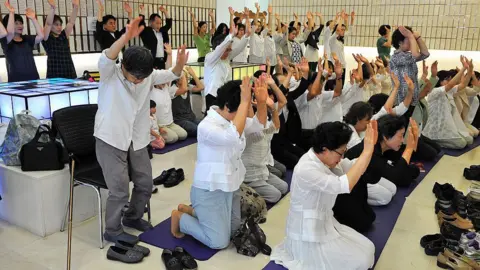Japan court dissolves controversial 'Moonies' church
 Getty Images
Getty ImagesA court in Japan has ordered the disbandment of the controversial Unification Church, which came under scrutiny after the shock killing of former prime minister Shinzo Abe in 2022.
The alleged assassin had confessed that he held a grievance against Abe because of the ex-leader's ties with the church - he blamed the church for bankrupting his family.
Japan's education and culture ministry sought the church's dissolution and accused it of manipulating followers into making huge donations and other financial sacrifices.
But the church, more popularly known as the "Moonies", argued that the donations were part of legitimate religious activities. It can appeal to overturn Tuesday's ruling.
The order handed down by a Tokyo district court will strip the church of its tax-exempt status and require it to liquidate its assets, but it will still be allowed to operate in Japan.
During their investigation, authorities found that the church coerced followers into buying expensive items by exploiting fears about their spiritual well-being.
They interviewed nearly 200 people who said they were victimised by the church.
In a press conference after the ruling Tomihiro Tanaka, the head of the Unification Church's Japan branch, described the rationale for the decision as "completely unacceptable" and vowed to "fight to the end for the correct ruling to be made," adding that they are concerned that the court's decision "will lead to a chain reaction, causing even more social problems".
The church is the first religious organisation in Japan to be given a dissolution order, with the country's Religious Corporations Law providing that a religious order can be dissolved if its actions are "clearly recognised as being substantially detrimental to public welfare".
In its ruling, the court concluded that the church's problems had caused significant damage and that it was unlikely to voluntarily change its practices to ensure compliance with the law.
The Unification Church, which was started in South Korea, has established a presence in Japan since the 1960s. The name "Moonies" was derived from the name of its founder, Sun Myung Moon.
It has drawn controversy even before Abe's assassination for teaching that marriage is central to spiritual salvation. It is known for holding mass wedding ceremonies involving thousands of couples.
Since 2023, some 200 former believers who said they were forced to donate to the group have demanded compensations amounting to 5.7 billion yen ($38.5m) in total, according their lawyers.
Investigations following Abe's assassination revealed close ties between the secretive sect and many conservative ruling-party lawmakers, leading to the resignation of four ministers.
An internal investigation by former prime minister Fumio Kishida's Liberal Democratic Party found that 179 of its 379 lawmakers had interacted with the Unification Church.
The relationships ranged from attending church events to accepting donations and receiving election support.
The revelations about the extent and level of involvement of the controversial church and the LDP shocked the nation.
Update 5th April: This article has been updated to include details from the church's response in a press conference on Thursday 27th March.
